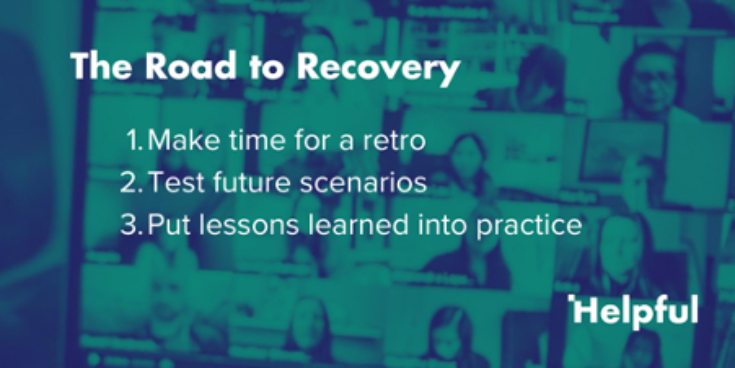Covid-19: The road to recovery
Chris Malpass, Executive Director of Helpful Digital, says that organisations can make the most of the Covid-19 crisis by making time for structured reflection and planning.

Helpful Digital's three key elements for a frank and constructive review as organisations begin to look to the future and recovery
Whether you’re the leader of a crisis management team or a frontline digital comms responder, the past months have tested us all like never before. Although you and your team are probably exhausted from what has been a draining and painful period, now is the time for honest and structured reflection.
Why? So that you can plot a path forward, safe in knowledge that you can replicate and build on the things you’ve done well, and that the same mistakes won’t be made again.
Resolving the immediate challenges presented by a crisis is often considered the end of the response, but this should be viewed as only the start of the next phase – the road to recovery.
The recovery phase is where you have an opportunity to take stock of where you are immediately post-crisis, set objectives for where you want to be and develop a plan for how you will get there.
In some instances, this can lead to a fundamental overhaul of what an organisation does, how it does it and why – take Volkswagen and its ambitious commitment to electric car production following the emissions scandal as an example. In others, it may lead to some relatively minor changes to crisis plans and processes so that any wrinkles are ironed out.
What matters is that you make the most of the opportunity to move forward as an improved, more resilient organisation.
The first step on the road to recovery is to run a structured after action review. This will help you to identify the changes you need to make to structures and processes; plan for new skills and capability; and get ready for organisational changes.
This needs to be done now, before valuable experience and knowledge fade.
Below are the three key elements for a constructive, honest review:
1. Make time for a ‘retro’
Before you can plan a way forward, you need to look back. This could be as simple as asking: What worked well? What could have been better? This process should be structured around the different aspects of your crisis plans and/or the response, including:
Objectives and strategy
Structures and processes
Team and individual responsibilities
Tools and templates
Technology and facilities
The key is to create an environment in which your team feels that it can give an open and honest assessment. This may be easier to achieve with independent facilitation.
2. Test future scenarios
Traditionally, crisis retros move straight from the review to forward planning stages, but you should use a scenario-based exercise to help focus thinking. We use our private, interactive Social Simulator platform to bring this section to life, but you could use a few PowerPoint slides at a stretch. This will give the team an opportunity to apply their lessons learned and start to think about what they would need to do differently next time. This component provides an effective bridge between the retro and forward planning stages.
Once you’ve identified what worked, what didn’t and what needs to do be done differently, it’s easier to devise an action plan for change and recovery.
3. Put lessons learned into practice
This is the key output from any review, as it will start the process of developing a plan for how you move forward from where you are to where you want to be. Knowing your vulnerabilities is useful, but you need a detailed action plan to ensure that you can implement change.
Your action plan should:
Be as specific as possible – don’t settle for phrases such as ‘shorten approvals process’. Break this down into the individual actions required to achieve this outcome;
Be realistic - actions that can be delivered within the existing resources you have available;
Prioritise activities - not everything can be top of the list.
This has already been a very difficult year for crisis responders. Now is the time to learn from what you and others have experienced to make sure you have the skills and processes in place to ensure you’re ready for whatever comes next.
Visit Helpful Digital's website if you have any questions about testing and evaluating your crisis response. Helpful Digital has also put together tips on managing an extended crisis response here.
The author
Chris Malpass is an expert in crisis and reputation management and leads Helpful Digital and Social Simulator in the USA. He has worked extensively in the field of crisis communications, helping organisations from across sectors to develop, embed and test crisis preparedness programmes.
Prior to joining the Social Simulator, he worked for Regester Larkin, a specialist crisis and issues management consultancy. Chris delivers regular lectures on crisis communications. He has an MA International Public Relations from the Cardiff School of Journalism.
Thumbnail image: ?? ?/123rf
Chris Malpass, 04/08/2020